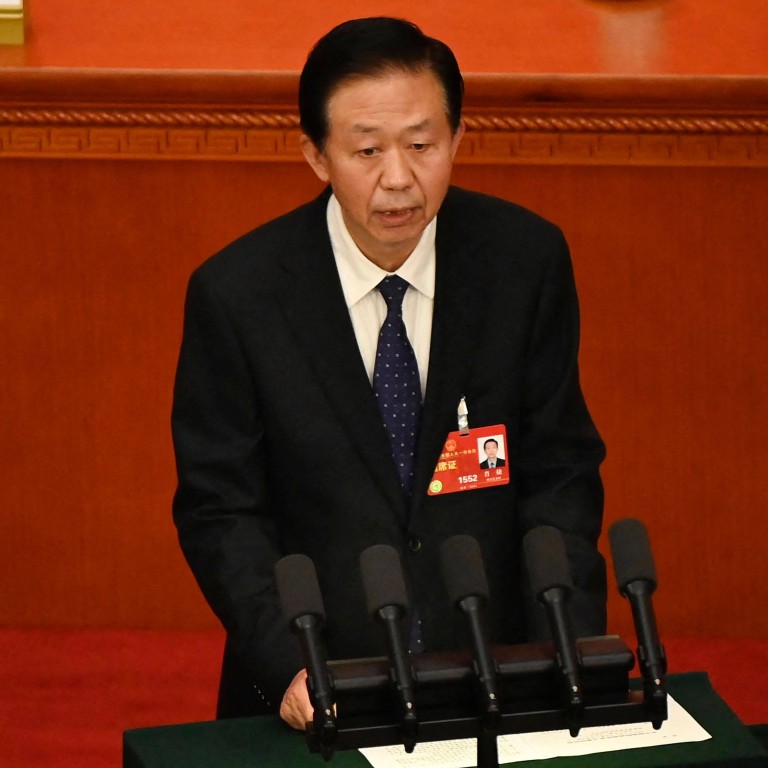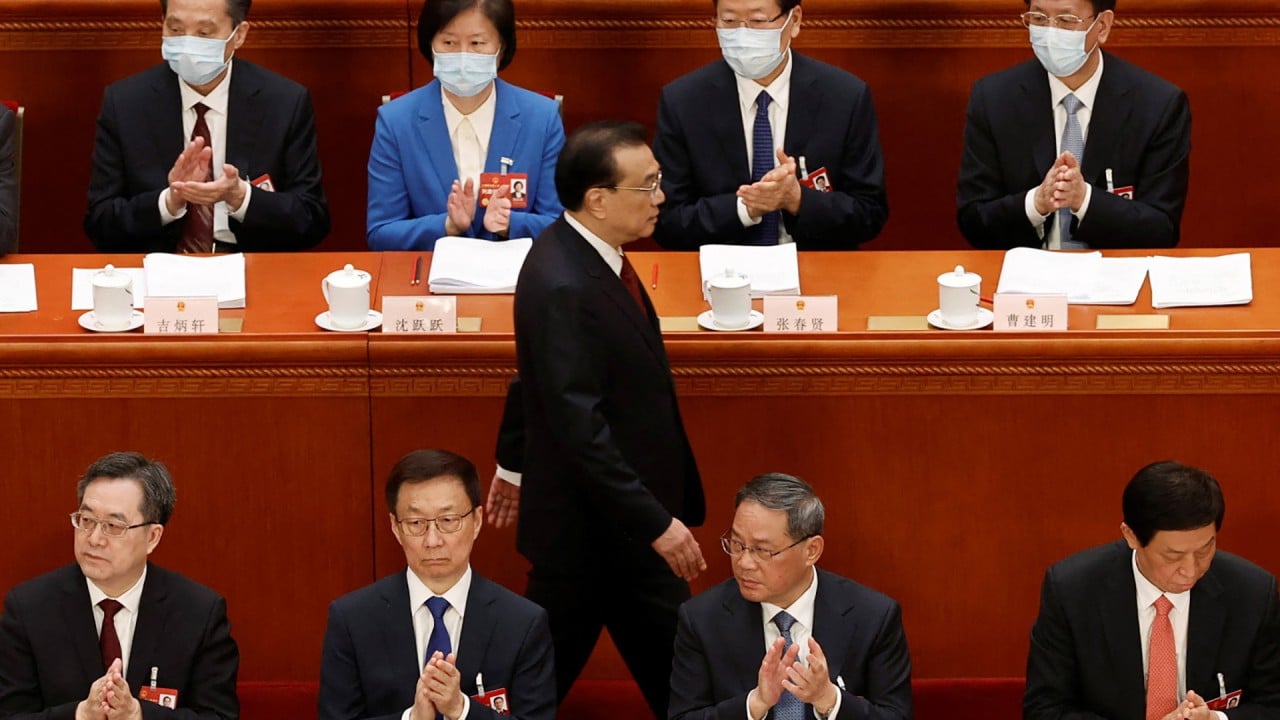
China’s ‘two sessions’ 2023: Beijing responds to US tech curbs, financial risks with sweeping regulatory shake-up
- Beijing will create a new oversight body for parts of the finance sector, strengthen the science and technology ministry, and establish a new data regime
- The restructuring fits President Xi Jinping’s efforts to fortify China against what he sees as growing external uncertainties and a domestic economic slowdown
China said on Tuesday it would establish a super regulatory body to oversee the country’s 400 trillion yuan (US$57.7 trillion) worth of banking and insurance assets, part of a sweeping reform plan Beijing hopes will strengthen capabilities to control risks and counter external headwinds.
It is the third major restructuring since President Xi Jinping took office in 2013, with the last in 2017-19 leading to the establishment of the Financial Stability and Development Commission and the veterans affairs ministry.
Why did Beijing set a moderate target for China’s GDP in 2023?
The full extent of changes, potentially involving Communist Party institutions, is expected to be unveiled over the course of the “two sessions” as Xi looks to consolidate his leadership.
The changes fit the president’s efforts to fortify China against what he sees as a fast-changing world marked by growing external uncertainties, as well as a domestic economic slowdown.
“The key is to strengthen science and technology, financial regulation, data management, rural revitalisation, property rights and the work for the elderly,” Xiao Jie, secretary general of the State Council, said in a statement about the restructuring.
The Ministry of Agriculture and Rural Affairs will receive more supervisory power over agricultural tech and the rural revitalisation plan, while the Ministry of Civil Affairs will take responsibility for overseeing the work for the country’s fast-growing elderly population.
The National Public Complaints and Proposals Administration, a key institution maintaining social stability, will be directly affiliated to China’s cabinet, rather than supervised by its general office.
Under the latest financial reform, the China Securities Regulatory Commission will be elevated to an affiliate of the State Council and put in charge of enterprise bond approval, which was previously the domain of National Development and Reform Commission, the country’s top economic planning agency.
The People’s Bank of China (PBOC) will also undergo restructuring, with the expansion of provincial branches one of the goals. Currently, the central bank has 11 regional branches across the country.
“[The establishment of a financial regulatory body] is set to address the long-standing contradictions and problems in financial areas,” Xiao said.
The new regulatory commission will be responsible for supervising financial institutions outside the securities sector, protecting investors and diffusing systemic risks, he added.
‘It’s less attractive’: China’s bid to lure talent hit by zero-Covid legacy
“The State Council reshuffle will be complemented by changes to Party institutions and the strengthening of ‘Party-building’, which will allow government bodies at all levels to implement directives released by the Party leadership,” said Xu Tianchen, an economist with the Economist Intelligence Unit.
“The top leadership has signalled its commitment to two core policy objectives: bolstering efforts to achieve self-sufficiency in key technologies, and making financial institutions better serve key national priorities.”
The overhaul of the science and technology ministry comes as Chinese industries, especially the semiconductor sector, face heightened US containment efforts. Domestic innovation needs a massive funding injection to make up lost ground.
More than 600 Chinese firms spanning the semiconductor, artificial intelligence and aerospace and aviation sectors, have been added to the US trade blacklist, which bars them from accessing American technology and components without US government approval.
Unless China can make breakthroughs in fundamental technologies quickly … it would be hard for China to solve the choke points
“Unless China can make breakthroughs in fundamental technologies quickly … it would be hard for China to solve the choke points,” said an executive of a major semiconductor equipment maker, who wished to remain anonymous given the sensitivity of the issue.
Speaking at the tone-setting central economic work conference in December, Xi emphasised the importance of preventing systemic financial risk, especially that which was presented by the property market crisis and hidden debt amassed by local governments.
Commenting after the call for financing support for technological innovation on Monday, Xi raised the alarm again about financial risks.
“Some of our policies, if not done well, may become the sore point of corruption,” he said.
‘He has room to do something great’: what to expect from China’s next premier
He called for reforms to delegate power, streamlined administration and optimised government services, while saying supervision needed to be improved.
“It’s not OK to delegate power but have no supervision. Otherwise, it could detonate,” he said.
The institutional reshuffle comes as the current crop of financial cadres, including Vice-Premier Liu He, central bank governor Yi Gang, top banking regulator Guo Shuqing and foreign exchange chief Pan Gongsheng, exit the financial policymaking centre stage.
He Lifeng, the current chairman of the National Development and Reform Commission, is expected to become vice-premier in charge of financial work.
It is very important that the country is unified on the prevention of local financial risks
However, it remains unclear how the Financial Stability and Development Commission, a State Council agency headed by a vice-premier, will be affected in the current round of restructuring.
“It is very important that the country is unified on the prevention of local financial risks, because we have seen some rural banks recently with relatively large risks, such as the previous rural bank risk in Henan, which did not create a good social impact,” said Zhao Xijun, a finance professor at Renmin University.
The finance sector is a key target of Beijing’s anti-corruption drive. Dozens of senior financial officials and executives have been investigated in recent years, including former PBOC deputy governor Fan Yifei and former deputy head of the banking commission Cai Esheng.
Peng Peng, executive chairman of the Guangdong Society of Reform, said the restructuring will help reduce overlapping government supervision and improve efficiency.
“It’s generally good for all sorts of companies,” he said. “However, greater efforts are still needed to improve the overall business environment.”
Feng Chucheng, founding partner of independent research firm Plenum, said the private sector and foreign businesses in China are likely to have more clarity in regulation after the restructuring.
China is already the world’s second largest capital market that keeps luring foreign investors through qualified foreign institutional investor and connect programmes.
Following decades of financial opening, foreign investors now owned about 3.2 trillion yuan of A-share by the end of last year, or about 4 per cent of the total, while they also owned 3.39 trillion yuan of Chinese bonds by end-December, or 2.7 per cent.
Additional reporting by Mia Nulimaimaiti, Pan Che and Luna Sun



